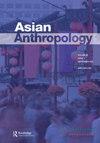成功与继承:农业旅游、异托邦与两代日本乡村女企业家
Q2 Social Sciences
引用次数: 1
摘要
摘要农业旅游业在日本被宣传为乡村振兴的工具。农家旅馆是农业旅游的一个例子,通常由女农民经营。他们通常创办一家小型家族企业,以找到一种足够舒适的谋生方式,其中一些人很少关注利润和增长;他们是生活方式企业家。这篇文章基于几年来对四位女农民和农家乐老板——两位长辈和她们的女儿/孙女——的多次采访,重点关注农家乐企业从老一辈到年轻一代的继承。对这几代人的生活故事进行比较表明,农场客栈为这两代人提供了农村妇女的新身份,但方式截然不同。本文章由计算机程序翻译,如有差异,请以英文原文为准。
Success and succession: agritourism, heterotopia and two generations of rural Japanese female entrepreneurs
Abstract Agritourism is promoted as a tool for rural revitalization in Japan. Farm inns are an example of agritourism and are run often by female farmers. They usually start a small family business to find a sufficient and comfortable way to make a living, with some of them focusing very little on profit and growth; they are lifestyle entrepreneurs. This article, based on multiple interviews conducted over several years with four female farmers and farm-inn owners—two elders and their daughters/granddaughters—focuses on the succession of farm-inn businesses from the older generation to the younger generation. A comparison of these different generations’ life stories shows that farm inns provide both generations with new identities as rural women, but in quite differing ways.
求助全文
通过发布文献求助,成功后即可免费获取论文全文。
去求助
来源期刊

Asian anthropology
Social Sciences-Anthropology
CiteScore
1.60
自引率
0.00%
发文量
25
期刊介绍:
Asian Anthropology seeks to bring interesting and exciting new anthropological research on Asia to a global audience. Until recently, anthropologists writing on a range of Asian topics in English but seeking a global audience have had to depend largely on Western-based journals to publish their works. Given the increasing number of indigenous anthropologists and anthropologists based in Asia, as well as the increasing interest in Asia among anthropologists everywhere, it is important to have an anthropology journal that is refereed on a global basis but that is editorially Asian-based. Asian Anthropology is editorially based in Hong Kong, Taiwan, and Japan, but welcomes contributions from anthropologists and anthropology-related scholars throughout the world with an interest in Asia, especially East Asia as well as Southeast and South Asia. While the language of the journal is English, we also seek original works translated into English, which will facilitate greater participation and scholarly exchange. The journal will provide a forum for anthropologists working on Asia, in the broadest sense of the term "Asia". We seek your general support through submissions, subscriptions, and comments.
 求助内容:
求助内容: 应助结果提醒方式:
应助结果提醒方式:


